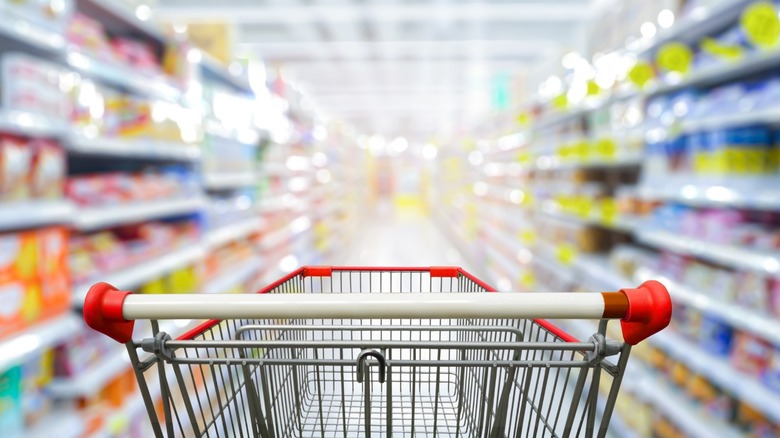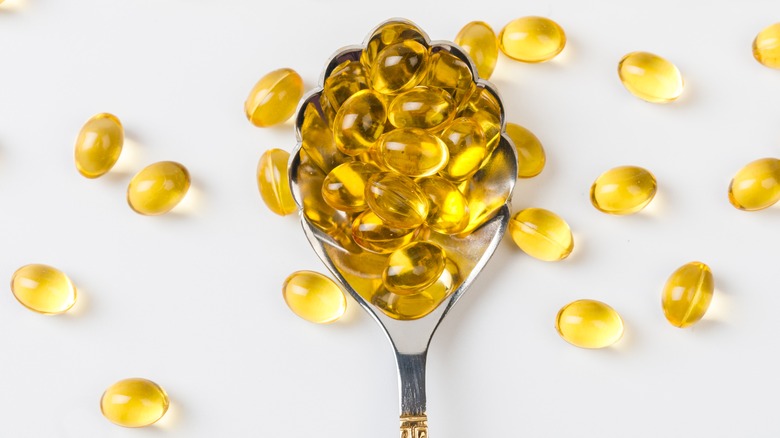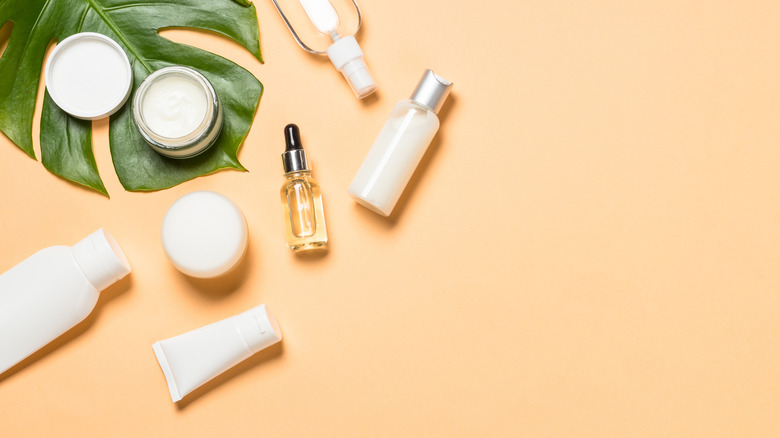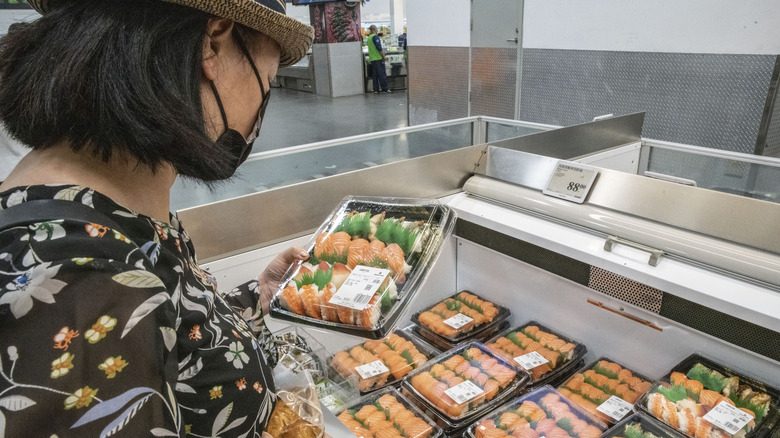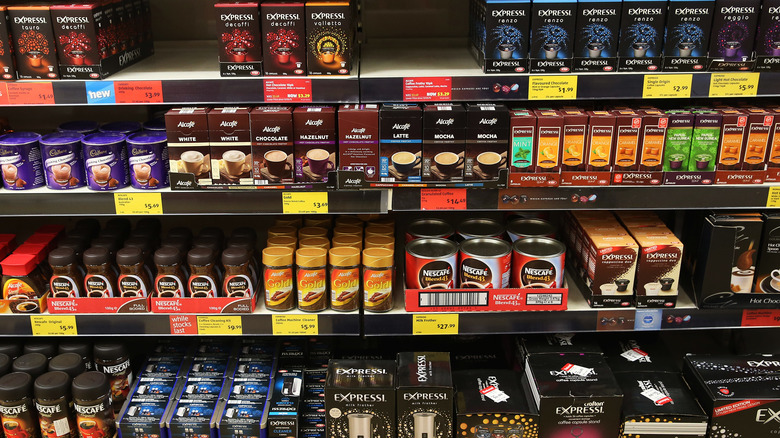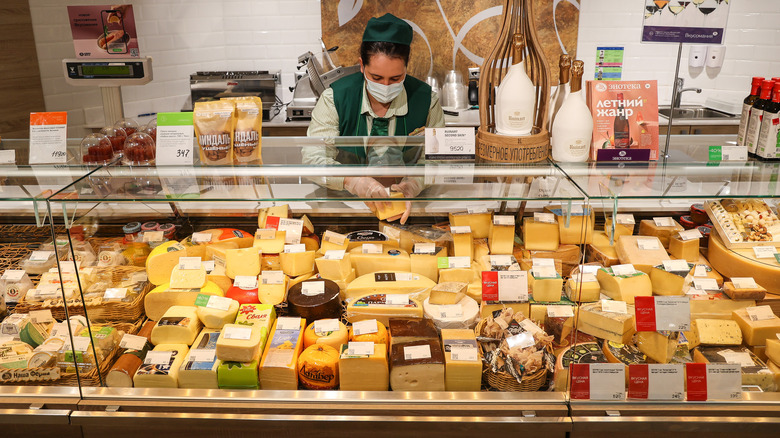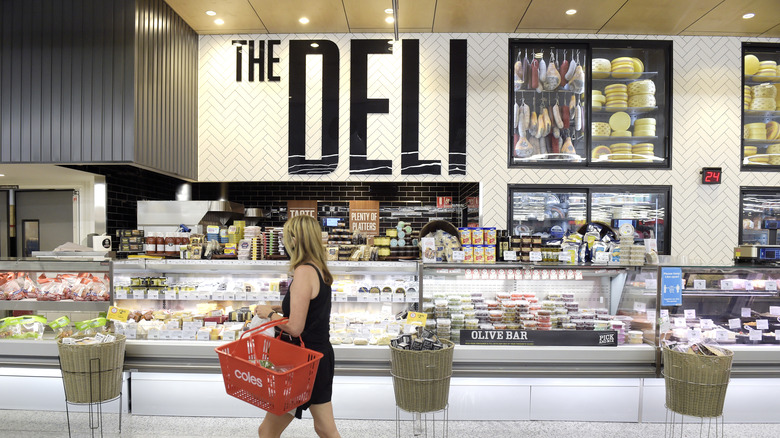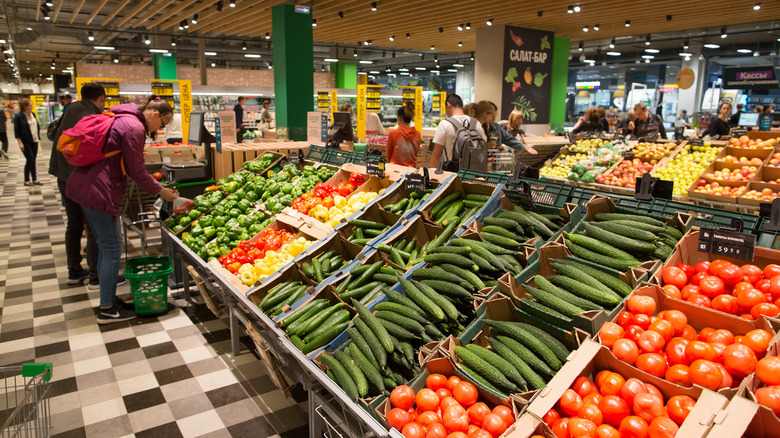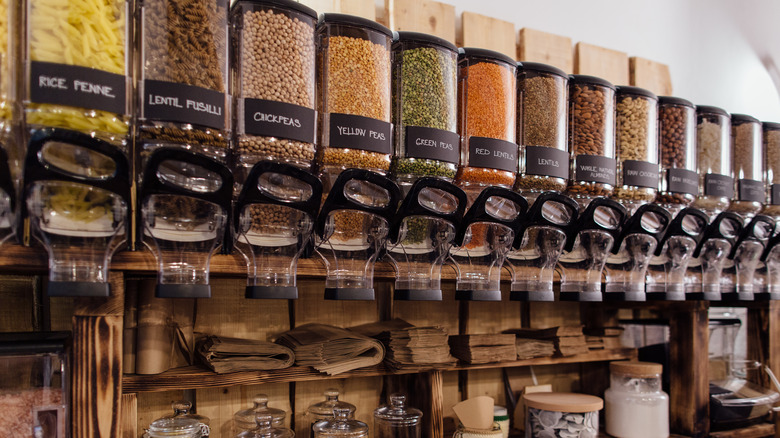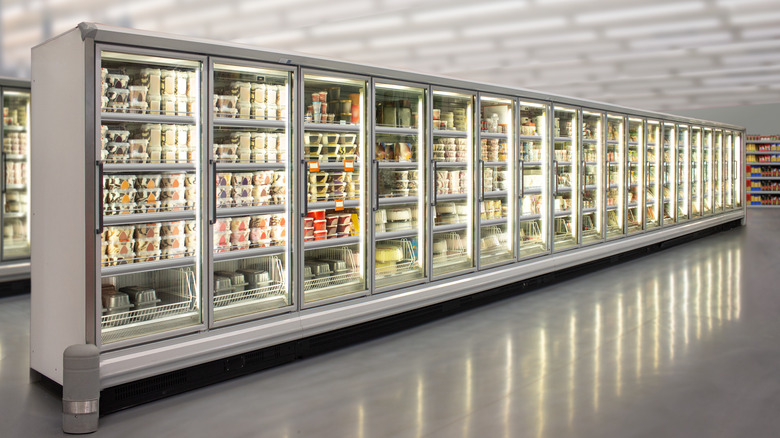The Most Profitable Items For Grocery Stores Might Surprise You
Grocery stores have taken a massive hit during the COVID-19 pandemic. In fact, Supermarket News reported that according to a poll conducted by the marketing firm Acosta, 30% of consumers say they frequent their local grocery stores less and less and opt instead for options like food delivery and online pickup services to obtain their groceries. Acosta's executive vice president of business intelligence, Colin Stewart, suspects these changes in food shopping could be permanent, even post-pandemic.
However, grocery stores are still making profits, although not very much when compared to other retailers. The Grocery Store Guy said that profit margins for groceries stores, in general, can be rather low, specifically around 1-2% for chain stores and 1-4% for independent stores. That's why grocers depend on certain profitable items in their stores to rake in the dough. But what kinds of items fall into that category, and how big of a boost do they provide?
Vitamins can earn 10 times more for grocery stores than food items
Vitamins are a multibillion-dollar industry, a $36 billion industry, to be exact, according to IBIS World. Obviously, some vitamins are more expensive than others, particularly those with certain brand names. Naturopathic physician Laurie Steelsmith pointed out factors like different ingredients, marketing techniques, quality testing, and the overall vastly varying qualities of different brands of the vitamins affect the bottom line when it comes to price (via The Upside).
According to Healthline, while vitamin and supplement sales comprise about 5% of grocery store sales, the respective profit margins in the stores are nearly 10 times more than food products. That's a lot of money for consumers to spend, especially when Healthline said, "Multivitamins are not a ticket to optimal health," at least when you're eating a nutrient-rich diet, in which case adding too many vitamins can actually be harmful. Too much iron, for instance, can cause gastrointestinal issues. "Other nutrition recommendations have much stronger evidence of benefits – eating a healthy diet, maintaining a healthy weight, and reducing the amount of saturated fat, trans fat, sodium, and sugar you eat," said Dr. Larry Appel (via Johns Hopkins Medicine).
However, Premier Health stated that while the best way to get vitamins is through a healthy diet, if that isn't happening, vitamin supplements can help in multiple ways, including with cognitive development and immune system support and Livestrong noted that vitamins can be particularly beneficial for pregnant women, those with low calorie intake, and vegetarians.
Body care purchases are growing
You may not think to hit up your grocery store's beauty aisle for things like shampoo and body wash, but maybe you should, as Grocery Dive reported that grocery stores are taking this section more seriously, stating that in 2018 health and beauty product sales grew 1.5%. Management consultant and advisor Hana Ben-Shabat said the best way for grocery stores to profit off body care and beauty lines is to make sure the products they are marketing fit with the store's niche and target audience; for example, Whole Foods does well with its organic skincare products. How do the stores get you to buy more?
The aisles in the body and beauty care sections are often wider, Ben-Shabat reported, to allow for better browsing, and some stores, such as some ShopRites, have beauty advisors on staff to help customers. Interestingly, according to Progressive Grocer, the pandemic has actually aided in sales growth when it comes to body care and cosmetics, noting a 5% growth in beauty care sales in 2021. Additionally, more and more beauty shoppers were looking for products at their local grocers after adopting a "one-stop-shop" mentality and thus limiting their exposure to the public and thus the virus by only having to go to one store for all their needs.
Shoppers are big on prepared foods
As of 2019, the number of shoppers buying prepared foods was booming. In fact, according to a report from the Food Marketing Institute reported on by Grocery Dive, 63% of grocery store consumers were purchasing 'semi-prepared and fully prepared foods' for dinner while 68% reported being "interested [in] ready-to-eat, grab-and-go meals." The most popular items include salads and sandwiches along with sushi and soups.
Still, 88% of shoppers express a desire for more variety of options as stores face competition in the prepared foods sector from restaurants, as consumers often opt to dine out or order take-out as opposed to purchasing a prepared meal. Interestingly, The Grocery Store Guy stated that prepared foods account for the majority of, if not all, in-store items offered. Thus, as Grocery Dive claimed, grocery stores can increase sales in the prepared foods department by diversifying their selections and offering fresher meals.
Coffee sales are roasting the competition
When you think of a business cashing in on coffee sales, you probably first think of coffee shop giants like Starbucks or Dunkin'. But grocery stores also are making high profits when it comes to selling coffee, albeit in the form of beans or ground coffees. In 2021, market research company NPD reported that due to the COVID-19 pandemic, 81% of coffee lovers ceased to frequent local coffee shops and instead have opted to brew their own coffee at home, "up from 73%" pre-pandemic. Additionally, coffee drinkers have started purchasing more gourmet coffees as well as high-quality brewing devices.
"Consumers' palates are more sophisticated now when it comes to coffee. They've invested their time and money in bringing a gourmet coffee experience into their homes," said Joe Derochowski, home industry advisor at NDP Group. What's more, some coffee shops are turning their stores into mini grocers, carrying basic items like flour, bread, and eggs as consumers look for more one-stop shopping options to limit public exposure during the pandemic. Daily Coffee News predicts this practice could become permanent following the pandemic and many other coffee shops may follow suit when it comes to carrying grocery items as well as serving lattes.
These growth statistics aren't cheesy
From brie to feta, cheese is an ever-popular product, so it's no surprise it's one of the best-selling items in grocery stores. In fact, according to the IRI's Fresh Center of Excellence, consumers bought nearly $22.5 billion in cheese in 2020, an increase of 19.4%. Winsight Grocery Business attributed the booming sales to the pandemic, which it claimed inspired a plethora of comfort food dishes, many of which have cheese as a key ingredient.
Grocery stores noted successes in cheese sales 'across the board,' raking in more dough not just on mozzarellas and cheddars, but also on more unique varieties like blue and goat cheeses. Also most likely due to COVID-19 and shoppers' desire for quick, contactless grocery store trips, the sale of grab-and-go cheese also went up 31.4% for a total of $1.1 billion. According to Chad Vincent, CEO of Wisconsin's dairy checkoff group, growing cheese sales are here to stay. "Wisconsin cheese is the best selling thing in grocery stores right now," Vincent claimed in 2021 (via Brownfield).
Deli meats have large markups
Chron reported that deli counters have a profit margin of 38%. Lauren Grentman, a debt coach, stated that grocery store deli meats can be marked up by 50%, attributing it to the fact that a committed staff member must be specially trained and positioned to work the department. Even so, these numbers still leave plenty of profit for grocery stores. Per the International Dairy Deli Bakery Association, sales of deli meats were up 9.3% in 2020 for a sum of $7.2 billion (via Supermarket Perimeter), suggesting regardless of markups, more and more customers are buying deli meat and The Grocery Store Guy suggested the profits made off deli meat sales are due to sheer volume.
But despite the money aspect, is buying deli meat better than purchasing and consuming prepackaged meats, as some might suggest? A registered dietitian with Health Essentials from the Cleveland Clinic said yes, stating the meat is healthier and 'contains natural nitrates and is minimally processed' when 'sliced fresh off the bone.' Holistic nutritionist Joy McCarthy agreed that consumers should choose meats they can watch being sliced as opposed to packaged meats, which could contain unknown ingredients (via Chatelaine).
You'll have to open your wallet for quality produce
Everyone loves fresh fruits and veggies, but they come at a price. While produce makes up an average of almost 11% of all sales at grocery stores, Chron reported that markups on produce items can range anywhere from 50% to 75%, sometimes higher on products with shorter shelf lives like berries. This high markup is due to the fact that 20% of produce has to be discarded before it even reaches grocery store floors.
Another reason produce can be pricey is because grocery stores have to account for the salaries of produce department employees who must be both friendly and knowledgeable about the products. "Produce is, and will always be, a service-driven department within retail. Customers should be able to interact with produce clerks on a personal level. I think a major struggle in produce departments is trying to find the balancing act with labor and having the ability to have highly qualified individuals on the sales floors," said Blake Lee, director of produce, bulk, procurement, and merchandising at Bristol Farms, a store highly regarded for its selection of organic produce (via Progressive Grocer).
The bulk food trend is booming
You know the bulk aisle: sometimes confusing, sometimes intimidating, hopefully not messy, yet always fun. And what's more, The Counter called the bulk section a "retail win-win" that both saves shoppers money and makes stores more money as opposed to selling packaged branded items. This is because, as Waste and Resources Action Program, a nonprofit out of the U.K., stated, grocery stores save up to $170,000 per bulk product they sell versus prepackaged branded items. On the customer savings side, the organization reported that consumers save up to 60% on bulk purchases versus buying prepackaged branded foods.
Grocery Dive pointed out that more and more grocery stores are jumping on the bulk foods bandwagon including Giant Eagle, Hy-Vee, Kroger, Wegmans, and H-E-B, each hoping to cash in on the potential profits, and an increase in customers are climbing on board, too. Todd Kluger, Vice President of Sales and Marketing at Lundberg Farms, a rice company based in California, commented on the growth in purchases. "Being able to experiment with variety, being able to purchase as much or as little as they need, and looking for price to value are all drivers of interest from consumers in the bulk section," Kluger said.
Sales of frozen foods up from 2% to 21%
According to a report published by the American Frozen Food Institute and FMI – The Food Industry Association (via Supermarket News), sales of frozen foods were up a whopping 21% in 2020, compared to 2% in 2019. The organization attributes that growth to the pandemic but believes it will continue after COVID-19 protocols are lifted. The frozen food categories with the most significant growth were seafood (up 35.3%), chicken (up 34.7%), and appetizers (up 28.9%).
A 2021 Supermarket News article on the report quoted FMI Vice President of Industry Relations Doug Baker, who stated, "Shoppers are nearly a year into the COVID-19 pandemic and are having more family meals at home than ever before. They are looking for meal plans, culinary creativity, and convenient, cost-effective solutions. The frozen foods category offers these benefits to shoppers and that's why we see all areas – from meal ingredients to meal solutions – reaching new audiences and increasing purchases." Additionally, Grocery Dive notes that stores' "high-frequency" customers, many of whom are millennials, are inclined to buy more frozen foods, planning their purchases carefully beforehand and their meals around the items they buy.
